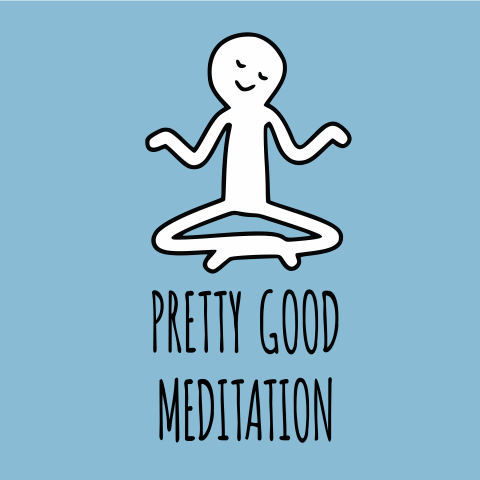
Meditation can be challenging, whether you are a total beginner or an experienced meditator. Dr. Matthew Tift draws on his experience teaching meditation and yoga to guide you towards peacefulness and clarity. Born from Midwestern sensibility, this meditation podcast does not take itself too seriously. Slow down, settle in, and experience the wholesome effects of guided meditation that is pretty good.
Audio file
In this meditation we bring attention to the points of contact with the body. We explore sensations, such as the feet touching the floor, hands on the lap, and clothing on the skin. These simple bodily sensations can help us to stay grounded in the present moment.
To leave a comment about this episode, visit matthewtift.com/prettygood/46. The theme music is "Maxixe" performed by Edson Lopes under CC BY 3.0.
Audio file
This meditation includes a centering exercise, some simple breathing exercises (pranayama), and other practices to help promote relaxation.
To leave a comment about this episode, visit matthewtift.com/prettygood/45. The theme music is "Maxixe" performed by Edson Lopes under CC BY 3.0.
44. Shine Your Light
Audio file
Stanley Kubrick once said, "However vast the darkness, we must supply our own light." Given the current state of the world, it can feel like there is a lot of darkness. In this meditation you share your light with the world, visualizing the light emanating from your heart, shining out into the world.
To leave a comment about this episode, visit matthewtift.com/prettygood/44. The background music is "Beautiful Relaxing Music for Stress Relief" by Relaxing Music and the theme music is "Maxixe" performed by Edson Lopes, both licensed under the Creative Commons Attribution 3.0 Unported license: https://creativecommons.org/licenses/by/3.0.
Audio file
Thoughts are part of the human experience, whether we are working out a plan or sitting in meditation. Meditation is not a place to escape from thinking or push away thoughts. Rather, it's a place to allow thoughts to settle. In this meditation, we notice the thoughts and practice remaining unattached to them.
Audio file
The benefits of gratitude meditation include reduced stress, better sleep, and increased happiness. Gratitude is a skill that can be practiced like any other skill. Sometimes we just need some reminders for all of the reasons to feel grateful. In this meditation we reflect on some reasons to be grateful, including the gift of life, our senses, the people we know and do not know, nature, physical items, and more.
To leave a comment about this episode, visit matthewtift.com/prettygood/42. The theme music is "Maxixe" performed by Edson Lopes under CC BY 3.0.
41. May You Be Well
Audio file
When we practice metta meditation, also known as Loving-kindness meditation, send positive emotions to others as well as to ourselves. In this brief practice, we will purposefully and mindfully offer loving-kindness to ourselves and others. There is nothing magical about this practice.
Audio file
Yoga nidra is an ancient technique, as old as any yoga, in which the body relaxes completely. It's used by healthcare workers, yoga therapists, the military, and others to help people with a variety of conditions, including post-traumatic stress disorder. In this practice, we scan and relax the entire body.
To leave a comment about this episode or watch the video version, visit matthewtift.com/prettygood/40.
The theme music is "Maxixe" performed by Edson Lopes and the background music is "Organic Meditations One" by Kevin MacLeod (incompetech.com), both under CC BY 3.0.
Audio file
Every moment is important, and we can practice giving importance to whatever comes up in the mind. It doesn't matter how ugly or unpleasant the thought, we can always end up with beauty. In this meditation, we smile to everything, to life in all forms, and bring a caring attitude to whatever arises.
To leave a comment about this episode, visit matthewtift.com/prettygood/39. The theme music is "Maxixe" performed by Edson Lopes under CC BY 3.0.
Audio file
Breath control can help us fold our awareness inward. Scanning the body and can help us relax. In this meditation, we pay attention to our breath, physical sensations, and mind, relaxing into the present moment and the mystery of life.
To leave a comment about this episode, visit matthewtift.com/prettygood/38. The theme music is "Maxixe" performed by Edson Lopes under CC BY 3.0.
Audio file
While I'm not particularly fond of the phrase "self care," I have found that there are places and times when self-care practices can be helpful. Self care includes making sure you are eating enough food to nourish your body, sleeping enough to allow your body to repair itself, and related practices. It also means checking in with yourself, in a healthy way, to help determine if you are being cared for. In this meditation, we pay attention to the breath, body, and mind, as well as create space for you to tune into your physical and emotional needs to help you show up more fully in your life.
To leave a comment about this episode, visit matthewtift.com/prettygood/37. The theme music is "Maxixe" performed by Edson Lopes under CC BY 3.0.